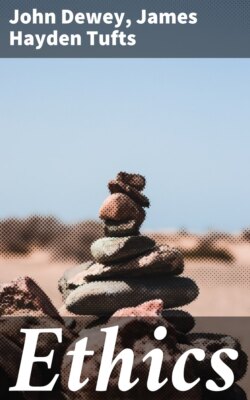Читать книгу Ethics - Джон Дьюи - Страница 18
На сайте Литреса книга снята с продажи.
§ 5. THE KINSHIP OR HOUSEHOLD GROUP WAS A RELIGIOUS UNIT
ОглавлениеThe kinship or household group determined largely both the ideas and the cultus of primitive religion; conversely religion gave completeness, value, and sacredness to the group life. Kinship with unseen powers or persons was the fundamental religious idea. The kinship group as a religious body simply extended the kin to include invisible as well as visible members. The essential feature of religion is not unseen beings who are feared, or cajoled, or controlled by magic. It is rather kindred unseen beings, who may be feared, but who are also reverenced and loved. The kinship may be physical or spiritual, but however conceived it makes gods and worshippers members of one group.[15]
1. Totem Groups.—In totem groups, the prevailing conception is that one blood circulates in all the members of the group and that the ancestor of the whole group is some object of nature, such as sun or moon, plant or animal. Perhaps the most interesting and intelligible account of the relation between the animal ancestor and the members of the group is that which has recently been discovered in certain Australian tribes who believe that every child, at its birth, is the reincarnation of some previous member of the group, and that these ancestors were an actual transformation of animals and plants, or of water, fire, wind, sun, moon, or stars. Such totem groups cherish that animal which they believe to be their ancestor and ordinarily will not kill it or use it for food. The various ceremonies of religious initiation are intended to impress upon the younger members of the group the sacredness of this kindred bond which units them to each other and to their totem. The beginnings of decorative art frequently express the importance of the symbol, and the totem is felt to be as distinctly a member of the group as is any of the human members.
2. Ancestral Religion.—At a somewhat higher stage of civilization, and usually in connection with the patriarchal households or groups in which kinship is reckoned through the male line, the invisible members of the group are the departed ancestors. This ancestor worship is a power to-day in China and Japan, and in the tribes of the Caucasus. The ancient Semites, Romans, Teutons, Celts, Hindoos, all had their kindred gods of the household. The Roman genius, lares, penates, and manes, perhaps the Hebrew teraphim—prized by Laban and Rachel, kept by David, valued in the time of Hosea—were loved and honored side by side with other deities. Sometimes the nature deities, such as Zeus or Jupiter, were incorporated with the kinship or family gods. The Greek Hestia and Roman Vesta symbolized the sacredness of the hearth. The kinship tie thus determined for every member of the group his religion.
Religion Completes the Group.—Conversely, this bond of union with unseen, yet ever present and powerful kindred spirits completed the group and gave to it its highest authority, its fullest value, its deepest sacredness. If the unseen kin are nature beings, they symbolize for man his dependence upon nature and his kinship in some vague fashion with the cosmic forces. If the gods are the departed ancestors, they are then conceived as still potent, like Father Anchises, to protect and guide the fortunes of their offspring. The wisdom, courage, and affection, as well as the power of the great heroes of the group, live on. The fact that the gods are unseen enhances tremendously their supposed power. The visible members of the group may be strong, but their strength can be measured. The living elders may be wise, yet they are not far beyond the rest of the group. But the invisible beings cannot be measured. The long-departed ancestor may have inconceivable age and wisdom. The imagination has free scope to magnify his power and invest him with all the ideal values it can conceive. The religious bond is, therefore, fitted to be the bearer, as the religious object is the embodiment in concrete form, of the higher standards of the group, and to furnish the sanction for their enforcement or adoption.
